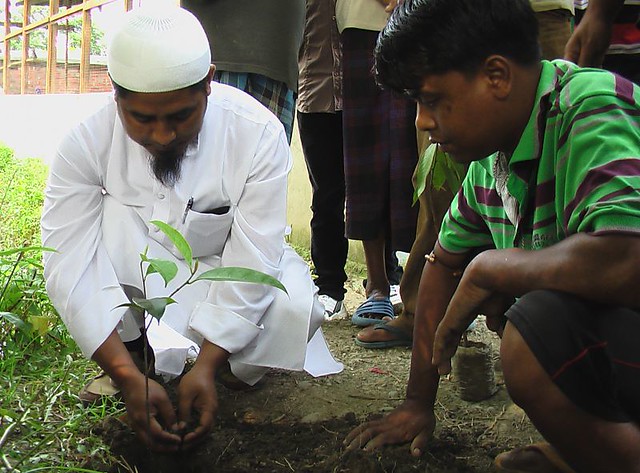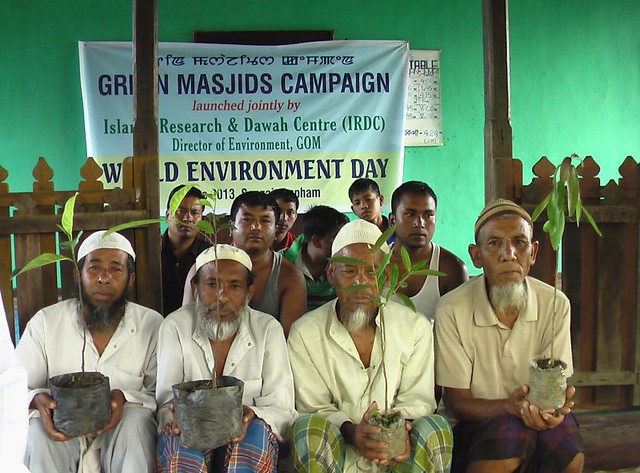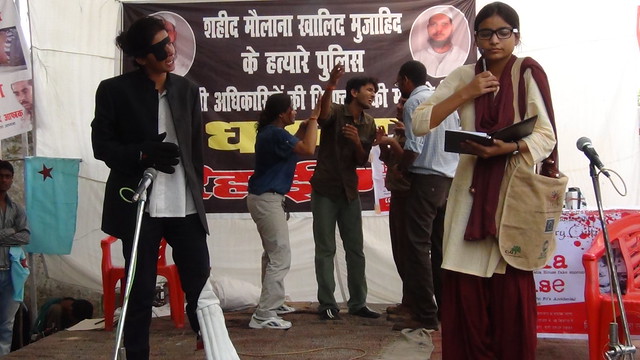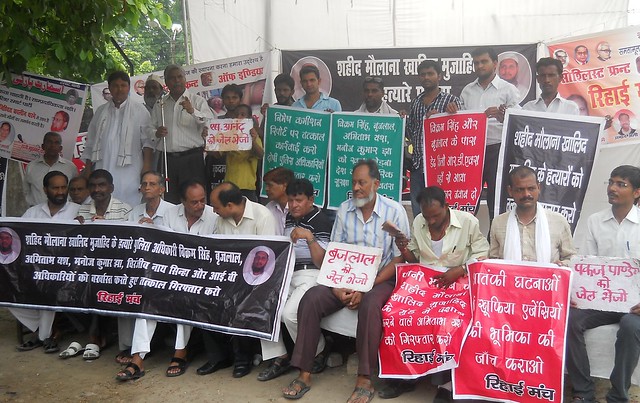By Mohd Ismail Khan, TwoCircles.net,
Hyderabad: Two National Investigation Agency (NIA) sleuths in safari suits with small notebooks in hand were waiting at Al-Shifa clinic making furious calls from their cell phones. Dr. Ibrahim Ali Junaid who was out to visit his diabetic patient has to again rush back to his clinic to meet new age Indian terror investigation officers.
Two NIA officers, both Muslims started shooting questions at Dr. Junaid on Dilsukhnagar blasts; they asked whom he think could be behind Dilsukhnagar bomb blast? A surprised, Dr. Junaid answered them in negative. As one officer was busy in informal interrogation other was busy in writing notes. After Dilsukhnagar, officer started asking him questions about Abdul Majeed who was falsely implicated along with Ibrahim Ali Junaid in Mecca Masjid bomb blasts case.
NIA officers asked Dr. Junaid when did Majeed leave India? Where does he live in Saudi Arabia? Is he involved in any activities? Getting mentally harassed Dr. Junaid looked at NIA officers with distress and told him politely, “Majeed’s family lives in Hyderabad, you should ask them directly, they will be in better position to answer all your doubts about Majeed.”
Taken by surprise, the NIA officer smirked and before leaving told Dr. Junaid, “this kind of talks can be informal, don’t always take it officially.”
This is how Ibrahim Ali Junaid, a Unani doctor by profession and an acquitted man in Mecca Masjid blast conspiracy case still has to struggle every day to keep that terror tag at bay.
After cursing little at those NIA officers for ruining his good busy day, Dr. Junaid settles in his arm chair and gets back to his work, treating his patients mostly from neighborhood. In between his busy medical practicing schedule Dr. Junaid arranged some time for an interview with TCN to trace down how all that terror labeling began, for this quite profession centric man.
Agitation for Protecting Waqf property made his first encounter with terror label in 2002. Dr. Junaid recalls an attempt was made in his locality by land sharks to encroach the Wakf property of a grave yard by installing a Ganesh statue. Dr. junaid who was an intermediate student at that time, along with other Muslim youths of his neighborhood protested and forced land grabbers to retreat. In 2003 events took a violent turn when land grabbers made another attempt but this time a well-planned one, at the height of Ganesh festival they installed the statue at grave yard’s Waqf land, this time with the help of local BJP MLA Indra Sena Reddy.
Dr. Junaid and other Muslim youths demonstrated vehemently against BJP MLA. “We protested against second attempt of installing that statue even facing brutal police force. We even protested vehemently against local BJP MLA which annoyed him a lot,” he said. That local BJP MLA threatened those youths of consequences on their protest.
Soon in January 2004 as threatened by the BJP MLA, Dr. Ibrahim Ali Juanid along with five other youths of his neighborhood had to face consequences; all of them were arrested in a conspiracy case to assassinate MLA Indra Sena Reddy, and waging war against the nation.
“I along with other youths of locality was arrested and kept in illegal detention for three days. During that period police used to beat me with gas pipes, iron rods and even used to pull my beard to mock at me,” recounts Dr. Junaid, his first taste of police brutality in their secret dungeons.
After three days of illegal custody Dr. Junaid who has just finished his 12th standard was produced before the court and spent next three months in jail for a case which according to him, “was a revenge from local BJP MLA who wanted to teach those protesting Muslim youths a lesson.”
Continuous police surveillance, police’ objections on civil rights activism :
Getting out on bail Dr. Junaid didn’t lose his hope on future, a bright student he appeared for highly competitive Unani medical entrance test and secured seat at historic Unani medical college near Charminar.
But Dr. Junaid said he witnessed worst kind of police harassment during his studies at Unani Medical College. “After getting out on bail, police harassment didn’t end, one police officer used to follow me till college, and other use to stand outside my class room. I even used to find officers outside my house, keeping tab on my activities, in 2005-06 the police harassment was severe,” he told TCN.
Keeping in view the police harassment he was going through, in 2006 Dr. Junaid started working with human rights and civil rights organizations to help people who were denied justice. His activism work, however, didn’t get down well with the police. “Police officers many times objected to my attempts to get involved in civil rights activism. Once I went to State Human Rights Commission to file a petition against AP police for their alleged involvement in Sohrabuddin fake encounter. But one officer intercepted me at the Commission and warned me from filing petition against police officers,” he said.
Witnessing Mecca Masjid Blast :
In 2007 when Ibrahim Ali Junaid was in his BUMS final year, his life’s biggest catastrophe struck him. On May 18th he was offering Juma prayer at Mecca Masjid which was located in front of his college, when suddenly he heard huge explosions, and what followed was beyond his imaginations.
“There was pool of blood with injured and dead bodies everywhere and people crying for help. I never witnessed such kind of scene before, it was just like something we heard happening in Palestine or Kashmir. Suddenly I saw one of my professors lying on the ground injured with his ear completely blown up. I picked him up and took him to the hospital, and helped other injured in getting into ambulance.”
When Dr. Junaid returned home after admitting his professor and other injured in the hospital he was heartfelt on the events of the bomb blast. Ibrahim Ali Junaid on 19th May accompanied a human and civil rights fact finding group to Mecca Masjid blast site, and the very next day on 20th May Special Investigation Cell (SIC) gave him a notice and called him for questioning regarding investigation of the blast.
![]()
Dr. Ibrahim Ali Junaid at his chamber in Hyderabad.
SIC interrogation in Mecca Masjid blast case:
“Some time I feel there is utter blind bias and poison in the heart of police force against the Muslim community. Within days of the blast, they made Muslim youths which were there usual suspects again a target in the name of Mecca Masjid blast investigation,” said Dr. Junaid, who was called by the SIC four times during that period for interrogation regarding Mecca Masjid blast investigation. After this mental harassment became unbearable Dr Junaid held a press conference and refused to attend fifth round of interrogation, “When I refused to attend them fifth time Investigating officer told me ‘we will get you any time’.”
In SIC interrogation office Dr. Ibrahim Ali Junaid observed it was more like a mental torture than interrogation. font color="red">During interrogation investigating officers rather than asking questions used to give hours of lecture to Dr. Junaid that Muslims are terrorists, and then used to jump on the obscure question of who could be behind Mecca Masjid bombing.
Dr. Junaid reply was, “I told those officers that it is their duty to do the investigation that is why government pays them, not for asking illogical questions and wasting time.”
When officers in SIC kept on repeating the same set of questions, Dr. Junaid says, he told them directly: “Why don’t you officers investigate involvement of RSS and VHP, in their speeches they always declare war against Muslims.”
On this answer, a senior IPS officer took out his revolver and threatened him of consequences on speaking like that against RSS and VHP, alleges Dr Juanid, adding that the same IPS officer had told him, “You Muslim crooks are the real terrorists, RSS is a group of real patriots.”
During interrogation investigating officers rather than asking questions used to give hours of lecture to Dr. Junaid that Muslims are terrorists, and then used to jump on the obscure question of who could be behind Mecca Masjid bombing.
He was returning from Delhi after a study tour and was arrested by SIC officers at Yakutpura railway station.
Illegally detained and tortured, forced to give confession in Mecca Masjid bombing:
Dr. Junaid was kept under seven days of illegal detention and “tortured like an animal,” every cruel method we heard happening to dissenters in Communist China was done to him in a democratic nation; from electric shock on genitals, to beating for hours hanging him upside down. He had to bare all the abuses in the name of religion, police even forced him to recite ‘Jai Sri Ram’ in order to have a break from torture, he says.
“In those seven days police continuously forced me to give a confessional statement accepting my involvement in all the bomb blasts. I still failed to understand police officers who knew well I was innocent; but could not understand why they were forcing me to confess a crime I didn’t commit; to leave the blast investigation in cold storage by making me a scapegoat, whom were they trying to protect?” he still ponders.
After his family approached the Andhra Pradesh High court with Habeas Corpus petition, police had to present him before the magistrate. He was prosecuted by the city police in a conspiracy case of unleashing terror strikes in the city, but was presented before the media as a major arrest behind Mecca Masjid and twin blasts investigation.
Dr. Junaid was sent into Charlapally central prison and forced into Narco analysis test in Bangalore, which caused an impact on his brain nervous system. “I was a bright student from the beginning but after that forced Narco test, my brain became weak, I can feel the impact, I wrote my MD exams few months back and failed, first time in my life,” says a pensive Dr Juanid, memories of those tortuous days still afresh in mind.
Dr. Junaid spent six months in prisons before getting out on bail. When he got out from prison Junaid found out that his college had cancelled his admission and refused to allot permission for writing his final year examinations.
Feared with losing an academic year he had to knock the door of the High Court. It was only after the intervention of the HC that he was allowed to appear for his final year examinations.
Even after acquittals in terror cases police harassment continues:
In 2009 Dr Juanid was acquitted of all terror charges by the local court, and after few months he got acquittal in 2004 BJP MLA assassination case too. The city police were left embarrassed when a CBI enquiry, subsequently taken up by the NIA, arrested RSS workers in the Mecca Masjid blast case.
In January 2012 Andhra Pradesh Government allotted 3 lakh rupees as compensation and gave a ‘character certificate’ to Dr. Ibarhim Ali Junaid acknowledging the wrongs done by their police force in prosecuting him in a bogus terror case.
But Dr. Junaid said that the character certificate is of no use to him, as police harassment never ends for him. In state elections police came to his house and pressurized him to ‘bind over’ which was generally done to rowdy sheeter’s during sensitive days.
Dr. Junaid says that after every blast anywhere in the nation he starts feeling insecure, as police start knocking on his doors questioning details about the obvious suspects. “I am experiencing police harassment since 2003, now even in 2013 their prejudice attitude remains the same, after the Dilsukhnagar blasts SIT officers started calling me for questioning.”
Now sitting in his private clinic trying to solve the dilemma of his life, Dr. Junaid feels major portion of his life went wasted revolving around torture cells, courts and prisons; the only thing which kept him motivated and positive was his firm belief that Allah who never denies justice, he says.
Dr. Junaid, who just one week back got married, hopes to start a new life, and want some peace of mind without any tags of suspicion. It is being observed that even for a citizen of democratic nation rights are not assigned it has to be acquired. But for Dr. Junaid, a citizen of largest democratic nation, even acquiring peace in his life is a long pain sticking struggle.











